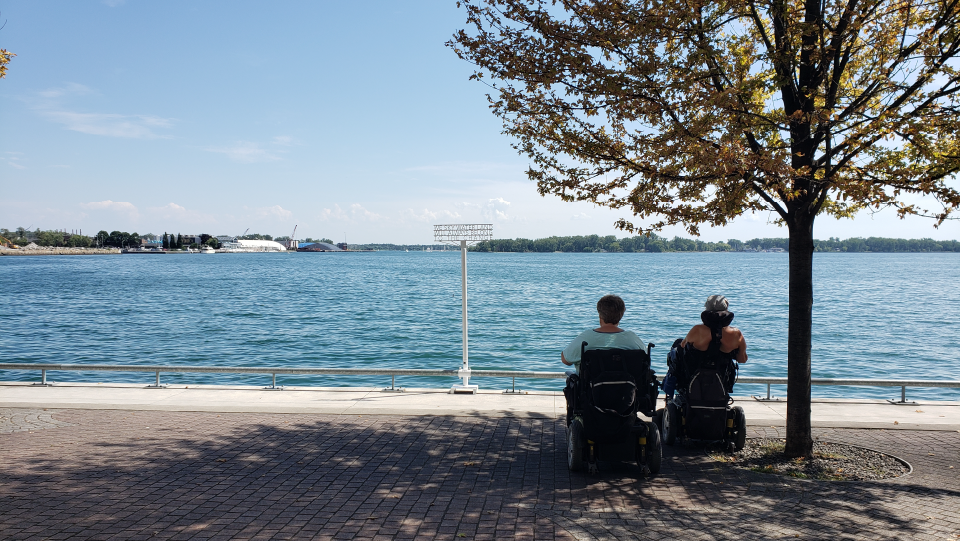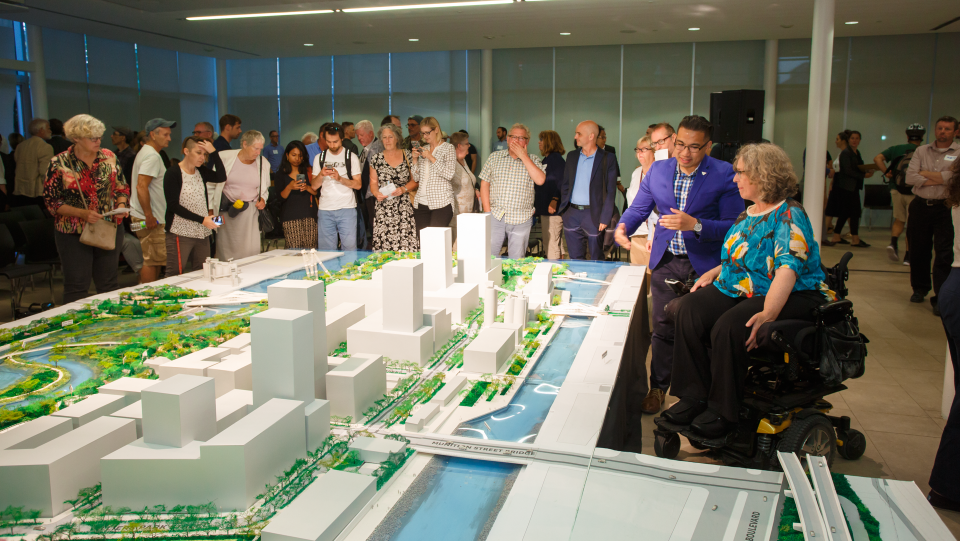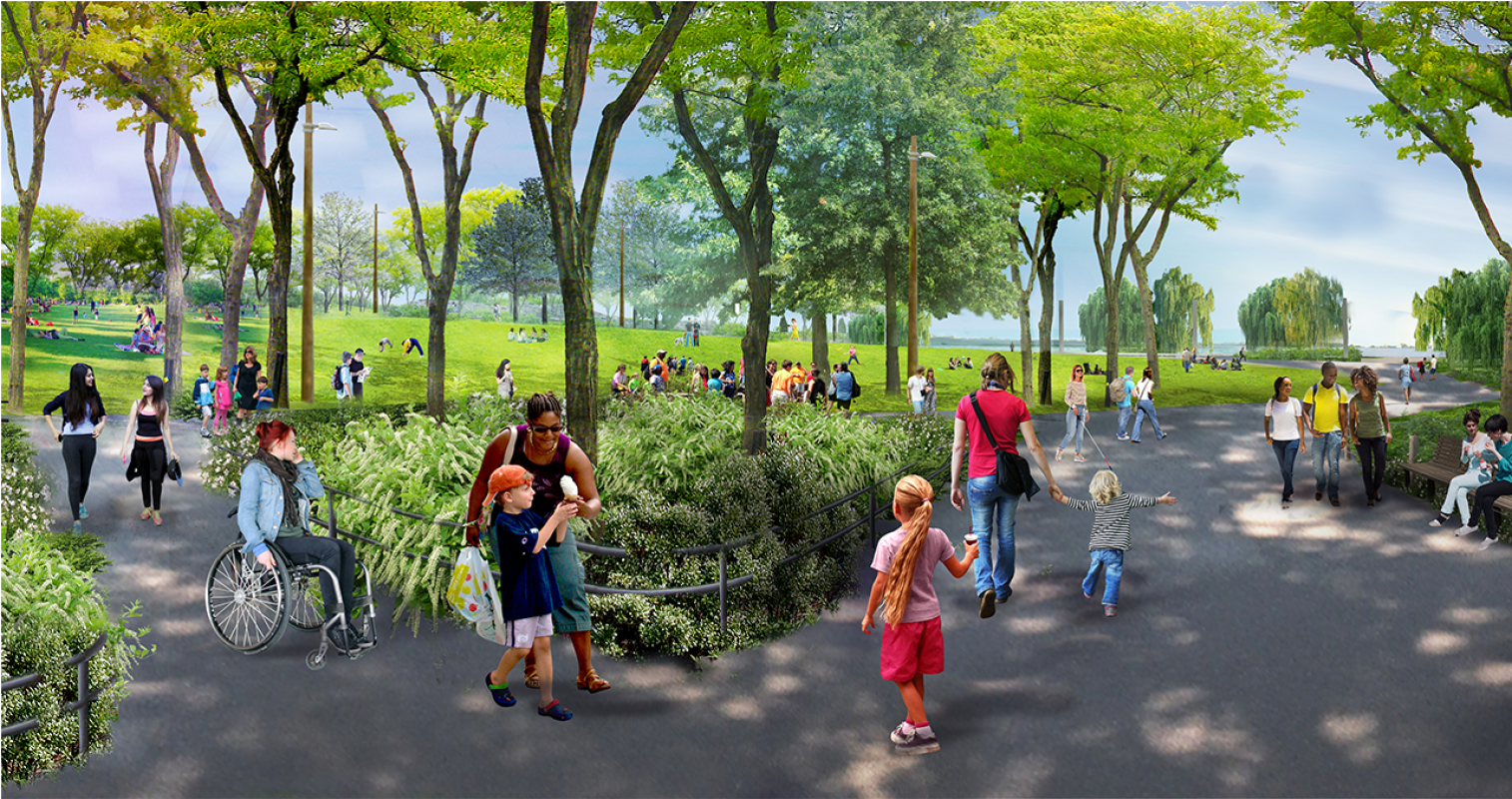Announcing the New Waterfront Accessibility Advisory Committee
POSTED: DECEMBER 3, 2023
In This Blog:
-
Our vision for a vibrant waterfront that belongs to everyone is only possible through a strong commitment to accessibility in everything we make and do.
-
We are pleased to announce the members of the new Waterfront Toronto Accessibility Advisory Committee, which will help implement our Waterfront Accessibility Design Guidelines.
-
This new Committee brings together individuals with lived experience, professional expertise, advocates, and caregivers all of whom have a passion for an accessible and inclusive waterfront.
-
Together, we will make accessibility another area of true design excellence on the waterfront.
Our vision is a vibrant waterfront that belongs to everyone. That vision is only possible through a strong commitment to accessibility in everything we make and do. To help us achieve this vision, we are pleased to announce the members of the new Waterfront Toronto Accessibility Advisory Committee (Committee). The Committee’s role is to help implement the Waterfront Accessibility Design Guidelines, helping us create accessible and inclusive public spaces on the waterfront where everyone is welcome and encouraged to participate.

The Accessibility Advisory Committee
The Accessibility Advisory Committee brings together individuals with lived experience, professional expertise, advocates and caregivers – all of whom have a passion for an accessible and inclusive waterfront. Following is a brief description of each individual. More detailed biographies can be found on the project page.
Dan Euser: Dan is a Landscape Architect who specializes in water feature design. In 1997 Dan founded Dan Euser Waterarchitecture (DEW), award-winning projects include urban centers, gardens, museums, memorials, waterfronts, and theme parks. In 2006 he received the OALA Pinnacle Award for Landscape Architectural Excellence.
Ipek Kabatas: Ipek is a parent of a young adult living with disabilities (quadriplegic spastic cerebral palsy, as well as bilateral hearing loss). For the past 19 years Ipek has fought discrimination and advocated for inclusivity as well as the elimination and removal of barriers. Passionate and committed to advancing accessibility and inclusion for all persons living with disabilities, Ipek has been actively doing so through ongoing collaboration with community groups, non-profit and grassroots organizations, and has been serving as an Executive Member of the Ontario Disability Coalition since 2017.
Diane Kolin: Diane Kolin is a PhD candidate in Musicology at York University, Toronto whose research focuses on disability and music. As a disability rights activist and accessibility advisor, she founded ArtsAbly, a multiservice company dedicated to accessibility in the arts. She is also a voice teacher and a singer who advocates for more accessibility in the music industry and in music education.
Roman Romanov: Roman is an internationally experienced architect with a disability and brings a wealth of lived experience to his work as an architect, designer, educator and accessibility specialist. Roman has worked with clients and projects in the US, Europe, Asia, and the Middle East, as well as most provinces and territories of Canada, before launching his practice, Linear Nonlinear Inclusive Design. He is passionate about amplifying disabled voices in architecture and design in order to attain equitable access, and he works at the intersection of empathy, design excellence, and usability.
Chris Stigas: With over 20 years of experience in electrical work and construction, Chris possesses extensive knowledge of AODA legislation and Building Codes. His expertise has been further enhanced through recent training and certification from the Rick Hansen Foundation Accessibility Certification program. Motivated by his own life-altering spinal cord injury, Chris has channeled his experiences into a powerful mission for positive change. His unique perspective combines pre-injury professional expertise with lived experience. Chris served on the Accessibility Advisory Council at University Health Network (UHN) since 2017 and a three-year tenure on the Advisory Committee on Accessible Transit (ACAT).
The two members below served on the previous accessibility committee and have been selected to be on the Accessibility Advisory Committee:
Bruce Drewett: Bruce retired from the Ontario Public Service in February 2021, where he served for over 33 years, primarily in the Ministry of Education. In that ministry, he served in several capacities, including: the director of Special Education and the Director of Leadership Development and School Board Governance. Over the past 35 years, Bruce has volunteered with several organizations, including: ARCH - Disability Law Centre, Spinal Cord Injury Canada, Family Service Association of Toronto, Easter Seals/March of Dimes, Roeher Institute, Anne Johnston Health Station, Citizens with Disabilities Ontario, and Waterfront Toronto's Accessibility Advisory Committee.
Amanada Karahanas: Amanda is passionate about the Toronto waterfront and its expansion to the east end of the Harbour. Amanda is an avid sailor and has sailed competitively in Canada and the US. As the President, Board of Directors, Disabled Sailing Association of Ontario (DSAO) for the last seven years, she brings a wealth of knowledge from her experiences both on and off the water, adding to the committee’s mandate of making Toronto’s waterfront more accessible.
These successful applicants were selected by a committee composed of three (3) Waterfront Toronto staff and two (2) former members of our Advisory Committee on Accessibility (ACA) – who helped develop the Guidelines and will provide continuity to new Committee, ensuring that there’s a throughline between the creation of the Guidelines and their implementation.
Nothing Without Us
Roughly twenty percent of Torontonians live with a disability. Add to this an aging population and thousands of visitors to our city (and our waterfront) who live with a disability. It’s a staggering number of people who are often unable to fully experience public spaces and the amenities they provide.
To provide true accessibility across our public realm projects we know that we must involve those who are most impacted by our work early in the design process. This new Committee will provide feedback, guidance and advice to Waterfront Toronto and its design consultants on the design and delivery of future public realm projects.
Next Steps

The Committee will review public realm projects being led by Waterfront Toronto, including new construction and projects that have reached the end of their lifecycle or require upgrades at the Schematic Design stage (30% design), and additionally, if required. The Committee’s comments will also be shared with the Waterfront Design Review Panel during its review of projects.
We look forward to working with this Committee, deepening our knowledge, hearing feedback, learning, and implementing their recommendations. Together, we will make accessibility another area of true design excellence on the waterfront.

